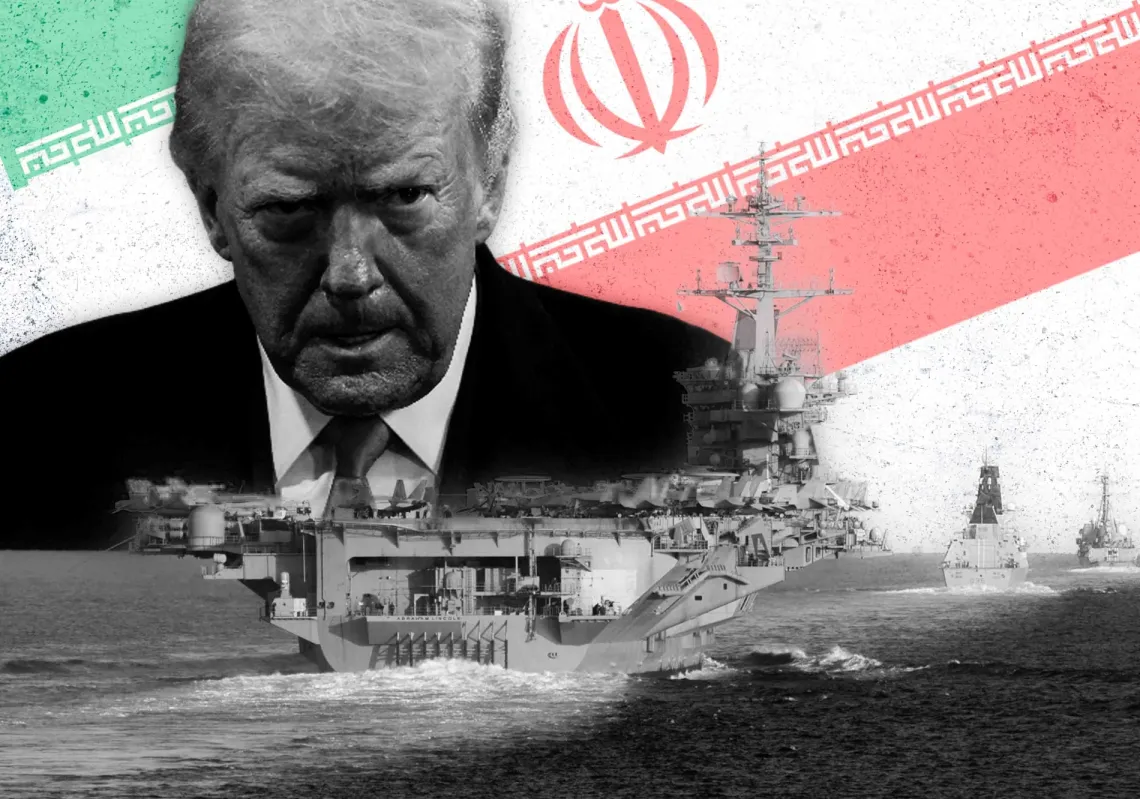Stephen Walt, world renowned professor of international affairs at Harvard’s John F. Kennedy School of Government, met with The Majalla to discuss one of the key security issues today, the possibility of Iran acquiring a nuclear bomb, and possible responses from the different actors involved. He offered his insight into the degree to which such an eventuality will change the dynamics in the region, and disclosed his opinion on what the US could do differently.
Walt was the academic dean from 2002 to 2006 at the John F. Kennedy School of Government, at Harvard University. Previously, he taught at Princeton University and the University of Chicago, where he served as master of the Social Science Collegiate Division and deputy dean of Social Sciences.
His published works include The Origins of Alliance (1987), Revolution and War (1996) and more recently, Taming American Power: The Global Response to US Primacy (2002). Together with John Mearsheimer, he coauthored The Israel Lobby and US Foreign Policy (2007), a New York Times Best Seller that started a heated debate inside the United States.
The Majalla: In looking at the current US policy towards Iran, what would you do different and what would you keep the same?
The United States and Iran have had an intense relationship ever since the Iranian Revolution in 1979/1980. In recent years, most of the focus has been on the United States and its allies attempting to halt Iran’s nuclear enrichment program. We’ve done that by trying to put as much pressure as possible on Iran through economic sanctions, and occasionally hinting that we might do something more extreme like using military force.
The main point I would make is that this simply hasn’t worked and it has not halted Iran’s enrichment program. It has not produced any kind of shift in Iran’s political orientation and it’s not likely to work going forward. I don’t think the United States is going to be able to get a set of international sanctions that would put that much pressure on Iran.
Threatening the use of military force simply gives the regime more reason to want to have some kind of deterrent capability of its own. Therefore, the only way to deal with this issue would be to essentially take the threat of military force off the table. We do this by saying we’re not going to try and overthrow the regime and we’re not going to attack its nuclear facilities and try to work out essentially some sort of grand bargain were we try to convince them that they are better off not getting a nuclear weapon capability. And that they will be allowed to have a nuclear power capacity and an enrichment capacity under the auspices of the non-proliferation treaty, and then begin to talk more candidly about the various security issues that both sides have been worried about for along time.
Q: Do you think that President Barack Obama’s administration has the support in Congress to do something like this?
Probably not. The Obama administration came in initially hoping that they could make a few friendly gestures towards Iran, and that that would produce a positive movement. I think this was naïve because essentially what they did was to say we’re willing to talk to Iran, we’re willing to have direct negotiations, and we would like to improve relations.
But what they fell back on was the Bush administration’s policy, which was to say first Iran has to give us the main thing we want, and to end its nuclear enrichment program. And then once they have done that, we’re willing to talk to them about the various things that they’re concerned about.
As I indicated before, this approach is simply not going to work. It didn’t work under President Bush, and it wouldn’t work under President Obama, no matter how many friendly gestures he makes and how many videos he sends on Iranian holidays. Ultimately, this is about the actual issues in front of us, and if we’re not willing to talk about things their concerned about, until they give us what we want, we won’t make much progress.
Q: Due to US sanctions, Iran is forming – and in some cases strengthening – economic relationships with other countries like China and Turkey. What message does this send to those who support sanctions on Iran, and what effects could this have on regional politics?
First of all, it reminds us that economic sanctions are not a very powerful weapon. Even when they are effective, they take many years to work. We’ve seen that in plenty other cases as well, and that is particularly true when the country you’re trying to pressure has other options.
And we have seen Iran expanding its economic dealings with neighboring countries, notably Turkey, but also with countries like China as well. And that is just another sign of how difficult it’s going to be to get a set of sanctions that will actually bite to the point that they would abandon key national priorities.
To me, the proper conclusion to draw from that is that you need to come up with a different approach. Now I might add that China has supported sanctions in the past, but always very reluctantly and always done its best to water them down. I think that reflects the fact that first of all that China wants to maintain good relations with Iran. Second, China doesn’t really want any kind of force being used in the region because that could be destabilizing; that could threaten energy supplies and things like that.
At the same time China doesn’t want this issue to be resolved anytime soon, because from China’s perspective, keeping the United States and Iran at odds with each other for as long as possible is a good thing. China would like this confrontation to never go to force and also to never be resolved, because it’s in China’s interest [for the US] to have a bad relationship with Iran.
Q: In an apparent effort to balance Iran, the Gulf states are rearming themselves, constituting what has been said to be the world’s largest peacetime rearmament exercise. How effective is such a strategy?
I think that it is quite effective. One key point to note is that Iran does not have an enormous military capability. Iran has a lot of long-term power potential; it’s got a large population; it’s got a lot of economic potential if the sanctions were lifted and the Iranian government adopted more sensible economic policies.
But right now Iran doesn’t have much of a capacity to threaten its neighbors; its military spending is rather modest, coming up to about $10 billion a year, which is quite small. Its military forces do not have the capacity to move large distances and it cannot threaten to conquer any of its neighbors or even intervene in a modest way.
So in that sense, Iran’s various neighbors in the Gulf can, I think easily, protect their interests and protect their own security with some modest military purchases, maintaining good relations with each other and with the United States. So the idea that Iran is about to dominate the Gulf anytime soon I think is a mistake. Furthermore if that started to be a real concern, then you would find, first of all, more cooperation occurring amongst the other Gulf states, and more support coming from other countries that have an interest in the security of that region.
It’s an issue to keep in mind but not an issue to be frantically worried about.
Q: Taking into account Iran’s military capabilities, does it not seem excessive that the Arab states are rearming themselves at such an early stage?
No. There have been a lot of tensions in the last weeks and months over the basic issue of Gulf security. And the Unites States has been attempting to make it clear to its various allies in the region that although we are now getting out of Iraq, and we are negotiating with Iran, we are certainly not forgetting our other interests in the region.
I also believe that—to some degree—the arms sales are almost a symbol of commitment. It is a symbol of the continued security partnership between the United States and some of these countries. It’s not so much developing and acquiring specific military capabilities to deal with a specific military threat as much as maintaining a close security relationship.
Q: In this context, what is the future relationship between Iran and the Gulf states?
What you often hear in the United States is the idea that the Gulf states are terrified of Iran and are desperate to have the United States protection. I think that exaggerated the situation considerably. I think the countries in the Gulf understand that Iran had a lot of power potential that could be a problem under certain circumstances.
I might add that was true under the Shah, at various times when Iran appeared to be rising in power and his ambitions were growing, and that was of some concern to his neighbors as well. This is not purely a function of the nature of the Iranian government; it has to do with Iran’s size.
But, at the same time many countries in the region had dealings with Iran for centuries. I once heard an official in the region say, “look we have been living next door to Iran for hundreds of years we know how to do this,” so I think, like many countries, they will be watchful as to what happens in Iran and how Iran’s power may change over time.
I don’t think its time for panic by any means, and I don’t think people in the region are panicking.
Q: Will the Iranians go all the way to achieve a nuclear bomb, or do you think they will stop short of it, keeping the capacity to build one if they choose to do so?
Obviously I don’t know because the Iranian government hasn’t confided in me about what their long-term intentions are. I think there are some good reasons to believe that they do not want to go all the way to get a fully functioning developed overt nuclear capability.
There may be ways that the rest of the world can convince them that that’s a bad choice. Having said that, I think that the most likely outcome is that they do want to have a latent capability and the capacity to develop nuclear weapons relatively quickly... if their own security program began to deteriorate and they began to worry that strong outside powers like the United States would prepare to come after them... But there are real consequences to an overt nuclear posture and I think if they can avoid that, they would prefer to do so.
People often compare them to Japan, that they might like to have a nuclear capacity similar to that of Japan where most people believe that Japan could acquire a nuclear weapons capability very quickly if they wanted to but they have not chosen to do so for a variety of domestic and international reasons.
It is worth noting that the many Iranian leaders have said openly that they do not want to get a nuclear weapons capability. They regard it as un-Islamic, and I certainly don’t think that you should take that at face value, but I don’t think that a final decision has been reached and I think in some respects this latent approach to capability I described would be the optimal posture for Iran.
Q: What do you think the Western response to something like that would be?
First of all, I think that the United States and its allies need to start thinking very hard about what their policies are going to be if that’s what happens. In a sense, I think that is the most likely result, if not in the near term, then eventually. We may not be able to stop Iran from acquiring that latent capability, but we may be able to persuade them not to take the next step.
Second, I don’t think that that is all that big of a problem or all that revolutionary development. You sometimes hear people speaking, quite foolishly, that Iran having a near nuclear capability would have revolutionary consequences for world politics or even for relations within the Gulf region.
They suggest that this would allow Iran to coerce its neighbors, to blackmail other countries, to impose its will on others and I think this is just foolish. No country has been able to use a nuclear capability to threaten or blackmail others. The Soviet Union couldn’t do that in the Cold War and they had tens of thousands of nuclear weapons. The problem of course, is that a nuclear threat isn’t all that credible if the person your threatening has the capacity to retaliate or has strong allies who might be willing to retaliate.
And, the risks of trying to carry out a nuclear threat are enormous and I don’t think Iran’s leadership is suicidal. So even if they had such a capability, they couldn’t use it to intimidate or brow beat other people. The only thing they could do is deter others from attempting to overthrow them.
Q: What sort of regional challenges do you foresee if Iran were to get the bomb?
I don’t think it will be a good thing, I would prefer it if Iran did not go down that road. I think it is the kind of event that people often talk about in very alarmist terms before it happens, and when it does happen, everyone adjusts to it kind of quickly.
So, if you go back in the 1960s, American politicians spoke of the possibility of China getting the bomb, almost paranoia. They would say this would be a horrible thing because the Chinese leadership was not rational and they would do all sorts of crazy things. Of course, once China tested a nuclear weapon people quickly adapted to the fact and realized it wasn’t that serious. Not a good thing, but not something you had to worry enormously about. I think that something similar would be true here.
It would raise some concerns in the region, no question about that. You would probably get some debates in some other countries about whether or not they wanted to follow suit, but I think not by any means inevitable that other countries in the Middle East would immediately imitate what Iran had done, particularly if it was a latent capability.
Israel has had nuclear weapons for 30 or 40 years and that didn’t immediately lead to every other country in the Middle East to go out and quickly try to get a nuclear weapon. There have been some nuclear programs in various countries, but they have not been as enthusiastic as this sort of panicky model as imitation suggests.
Q: Most government in the Middle East find it very hard to understand why the US lobbied last September to block an Arab-sponsored resolution in International Atomic Energy Agency (IAEA), which urged Israel to join the Non Proliferation Treaty (NPT). Can you explain to our readers what is behind the US position?
I think that’s just another manifestation of the special relationship between the United States and Israel. The United States gives Israel diplomatic cover in places like the IAEA or the UN Security Council, even when that’s completely inconsistent with other American policies in other realms, and that’s not entirely – but mostly – driven by domestic politics here in the United States, and the power of the Israel lobby.
Q: If, or when, Iran gets the bomb, do you think the chances of convincing Israel to sign the NPT will increase given that it will cease to be the only armed nuclear power in the region?
I think it’s very unlikely that Israel will sign the NPT. It’s conceivable that they would, but only if they were granted the status of a nuclear weapon state. I can’t imagine a set of circumstances in the next several decades in which Israel will give up its nuclear arsenal. Signing the NPT is not on the cards given Israel’s own security policies, which are their ultimate guarantee of survival.
Q: Israel and the Arab states have a common enemy in Iran, how will this affect the dynamic of the relationships between them?
First of all, Israel had a very good relationship with the Shah of Iran, and its relationship with Iran has been more complicated then just the idea that they’re embittered enemies. Things have gone worse since the early 1990s, but back in the 1980s Israel’s relationship with Iran was somewhat better. There were even some dealings between the two governments.
Certainly today there are a number of Arab states that are concerned about Iran, and Israel obviously is concerned about Iran, and that creates a potential for some degree of cooperation. The problem is the Palestinian issue. It continues to be a major source of division between Israel and its Arab neighbors. It is also an issue that Iran has been very effective at exploiting in this context.
So, what really ought to be happening if Israel were thinking clearly about this would be to solve the Palestinian problem by granting the Palestinians a generous two-state solution. That would eliminate the wedge that Iran can use to divide the Arab states, to challenge different Arab countries and to challenge Israel. It will make it much easier for Arab governments worried about Iran to cooperate with Israel in various ways to try and deal with that.
Unfortunately, granting a state to the Palestinians is not something the Israelis have been willing to do, which in my view is unjust, but also quite foolish from a strategic point of view.
Q: Does the regional problem of Iran serve to benefit or harm the Palestinians in their quest for a state?
I am not sure. On the one hand, as I have just said, it ought to be giving a lot of different parties an incentive to get the Palestinians a state. You can see the concerns about Iran as being a positive development, to get everybody to agree that we have got to solve this Palestinian issue once and for all so we can deal with Iran.
The problem is that it has also been used as a distraction, so whenever the United States and others want to get serious about the Palestinian issue, the Netanyahu government will say, “well that’s fine, but we need to worry about Iran.”
So on the one hand, it ought to be something that would be good for the Palestinians, but it hasn’t been, in part because the Iran issue has been used as such a smoke screen.
People often talk about linkage between these two problems. For example, Israelis will say, “we can’t do a good deal with the Palestinians until we are feeling secure from Iran. Guarantee our security against Iran, get rid of their nuclear program, and then maybe we will be more generous towards the Palestinians.” Often that’s not true. It’s just been used as an excuse, but more importantly, you don’t want to link those issues too closely.
The fact is, the United States, Israel and the Arab states, to the extent that they are concerned about Iran, ought to have a set of policies designed to address those concerns. And, if those are smart policies, you ought to pursue them. And similarly, the United States, and Israel, and the Arab states ought to be working very hard to get a two-state solution before it’s too late. No matter what’s happening in the relationship with Iran, you don’t want to let either of those two issues be a barrier to making progress on the other.
And, when people try to link them, you essentially give different countries veto power over what you might like to do with respect to one issue. You don’t want to let Tehran decide whether or not you’re going to pursue peace with the Palestinians.
Q: How likely is it that Israel will attack Iran’s nuclear facilities and what would happen if it did?
I can’t rule it out, and I change my mind from month to month how likely it is. Ultimately, I don’t think so, mostly because an Israeli attack would not significantly delay Iran’s nuclear program. They could slow it down, but they couldn’t eliminate it, and it has at least the potential to cause lots of trouble for the United States and others in the region.
The United States would be blamed for it, even if we didn’t think it was a good idea. On balance, I don’t think it will happen; I don’t think it will be very smart, but the Israelis have done a lot of things that weren’t very smart in recent years.
Q: To what extent does Israel have a say right now over the Iranian issue in the United States?
I think Israel’s opinion is taken seriously in the United States by many people, and certainly the groups here, the so called Israel lobby, have been the most hard-line in pushing the United States to do something about Iran’s nuclear program.
I think if you didn’t have the Israel lobby, the United States would still be worried about Iran’s nuclear program the same way we are worried about other countries like Pakistan or India. But, people would not be talking about using military force to try and prevent it. They would not be talking about preventive war, and we would in fact be more likely to be pursuing a much more ambitious diplomatic program designed to try and resolve the differences between the two countries and move forward.
Q: How is this situation with Iran affecting the US war in Afghanistan and its presence in Iraq?
I think the American military presence in Iraq for the last eight years and in Afghanistan has two different effects. First of all, it has greatly increased Iran’s sense that it’s threatened by the United States. You have the world’s most powerful country with large military forces on two countries on your borders, plus a naval presence in the Persian Gulf and Indian Ocean, and close partnerships with many countries in the Gulf.
If you were Iran you would really be worried about this, particularly when you have prominent American politicians talking about regime change, talking about how we really need to do something about the clerical regime. Whatever one thinks of Iran, it is pretty clear that this is something they regard as potentially threatening the same way any country would.
The second point is that the American involvement in Iraq and Afghanistan, because it has gone so badly, also puts a real limit on the pressure the United States could bring to bear on Iran. This is because there are lots of things that Iran could do to make life more difficult for the United States in either Iraq or Afghanistan.
Remember that Iran actually helped the United States in a variety of ways when we went into Afghanistan in 2002, and Iran has never had a close warm feeling towards the Taliban. There are still lots of things they could do to help the Taliban to make our lives more difficult in Afghanistan. There are certainly things they could do—and probably have done in the past—to make life more difficult for us in Iraq.
So, in a sense, our presence there really complicates the relationship in a variety of ways. It makes Iran more worried about us, but it also makes it harder for the United States to do very much about Iran because of the ways that Iran may be able to retaliate.
Q: What international relations theory best explains what is happening now in the region?
This will not surprise you, but as a first cut, I always tend to fall back on variations of the balance of power theory. American objectives in the region, for decades, have been primarily to maintain a balance of power there, and those policies have tended to work, I might add, when we follow more or less the balance of power approach.
Certainly the concerns that the countries in the region have to do with their concerns when they think one country is getting too strong, or too ambitious, as was true with Iraq at various points.
In the past it was true with Iran, and I would add that when leaders have forgotten about the importance of the balance of power in politics, or adopted different strategies, they’ve tended to get into trouble. So when the United States followed the policy of dual containment in the 1990s, this was really quite foolish. We were essentially attempting to balance against two countries simultaneously that didn’t like each other.
Also, when President Bush adopted the strategy of regional transformation—we were going to transform the entire region at the point of a gun—this was even more foolish. Of course we have all seen the results in Iraq, so I tend to think of the region largely in balance of power terms, and I think if American policy uses that framework, we are more likely to have results we like as opposed to results that we regret.
Q: At present, the administration would like to apply a humanitarian framework in its foreign policy. How do you feel about this?
I’m not sure what that means. One feature here is that I think the United States needs to get out of the business of telling lots of other countries how to run their affairs. We can provide some advice and we can provide some suggestions, but the fact of the matter is, we don’t know how to govern places like Iraq or Afghanistan.
We wouldn’t know how to run Iran if we were suddenly in charge of that. I would say that’s largely true of other states in the Gulf and states throughout the Middle East, even other parts of the world.
The United States have their own interests, and they should pursue those energetically, but we should be much more humble about trying to reorganize the internal politics of the other countries. I think the last decade or so has taught us that we are actually not very good at doing that, and we’re as likely to cause more trouble for ourselves and for our friends then to make things better.
Q: Which writers from the younger generation are you following these days?
There are a lot of bloggers that I read now on a regular basis, whether it’s Andrew Sullivan or Philip Weiss, Matthew Yglesias and others. There is a historian, a Lebanese historian named Osama Makdisi, whose work I have been reading and enjoying very much.
Q: Are you working on a book right now?
I am working on a couple of different projects. I would like to write a book on American grand strategy for the 21 century, and suggest ways in which the United States can rethink how it deals with the rest of the world as a whole, not just in any particular area.
Second, I’m working on a book about why it is so difficult for countries to get out of military commitments, even when they’re not going well. Why is it hard to cut your losses when you’re in a losing war? Why do countries tend to stay in these wars much longer than they should?
You often see states stay in war far too long. You rarely see them get out too early, and I’m trying to explain why that’s the case, and suggesting how we might be able to fix it. Finally, I continue to write on various Middle East affairs, and would probably do something more on that subject in the future too.
Interview conducted by Jacqueline Shoen








